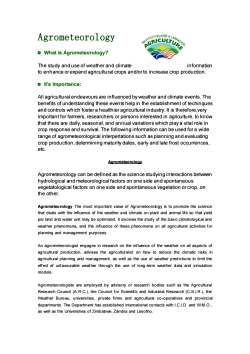《农业气象学》课程教学资源(文献资料)Agrometeorology

AgrometeorologyANLRICULTWhatisAgrometeorology?The study and use of weatherand climateinformationto enhanceorexpandagricultural crops and/orto increase crop production.It'sImportance:Allagriculturalendeavours are influenced byweatherand climate events.Thebenefits ofunderstanding these events help in the establishment of techinquesandcontrolswhichfosterahealthieragriculturalindustry.Itistherefore,veryimportantforfarmers,researchers orpersons interested in agriculture,toknowthatthere are daily,seasonal,and annual variations which playa vital role incrop responseand survival.Thefollowing information canbeusedfora widerange ofagrometeorological interpertations such as planning and evaluatingcropproduction,determiningmaturitydates,earlyandlatefrostoccurrences,etc.AgrometeorologyAgrometeorologycanbedefinedasthesciencestudyinginteractionsbetweenhydrologicalandmeteorologicalfactorsononesideandspontaneousvegetatologicalfactors on oneside and spontaneousvegetation orcrop,onthe other.Agrometeorology The most importantvalueof Agrometeorologyis topromotethesciencethat deals with the influence of the weather and climate on plant and animal life so that yieldperland and waterunitmay be optimized.It involvesthe studyof thebasicclimatological andweather phenomena, and the influence of these phenomena on all agricultural activities forplanningandmanagementpurposesAn agrometeorologist engages in research on the influence of the weather on all aspects ofagricultural production, advises the agriculturalist on how to reduce the climatic risks inagricultural planning and management, as well as the use of weather predictions to limit theeffect of unfavourable weather through the use of long-term weather data and simulationmodels.Agrometeorologists are employed byadvisoryorresearch bodies suchastheAgriculturalResearch Council (A.R.C.),the Council for Scientific and Industrial Research (C.S.I.R.), theWeather Bureau,universities,private fims and agricultural co-operatives and provincialdepartments.TheDepartment has established international contacts withI.C.I.D.and W.M.O.,aswellasthe Universities ofZimbabwe,Zambia and Lesotho
Agrometeorology What is Agrometeorology? The study and use of weather and climate information to enhance or expand agricultural crops and/or to increase crop production . It's Importance: All agricultural endeavours are influenced by weather and climate events. The benefits of understanding these events help in the establishment of techinques and controls which foster a healthier agricultural industry. It is therefore,very important for farmers, researchers or persons interested in agriculture, to know that there are daily, seasonal, and annual variations which play a vital role in crop response and survival. The following information can be used for a wide range of agrometeorological interpertations such as planning and evaluating crop production, determining maturity dates, early and late frost occurrences, etc. Agrometeorology Agrometeorology can be defined as the science studying interactions between hydrological and meteorological factors on one side and spontaneous vegetatological factors on one side and spontaneous vegetation or crop, on the other. Agrometeorology The most important value of Agrometeorology is to promote the science that deals with the influence of the weather and climate on plant and animal life so that yield per land and water unit may be optimized. It involves the study of the basic climatological and weather phenomena, and the influence of these phenomena on all agricultural activities for planning and management purposes. An agrometeorologist engages in research on the influence of the weather on all aspects of agricultural production, advises the agriculturalist on how to reduce the climatic risks in agricultural planning and management, as well as the use of weather predictions to limit the effect of unfavourable weather through the use of long-term weather data and simulation models. Agrometeorologists are employed by advisory or research bodies such as the Agricultural Research Council (A.R.C.), the Council for Scientific and Industrial Research (C.S.I.R.), the Weather Bureau, universities, private firms and agricultural co -operatives and provincial departments. The Department has established international contacts with I.C.I.D. and W.M.O., as well as the Universities of Zimbabwe, Zambia and Lesotho
按次数下载不扣除下载券;
注册用户24小时内重复下载只扣除一次;
顺序:VIP每日次数-->可用次数-->下载券;
- 《农业气象学》课程教学资源(文献资料)The atmosphere.doc
- 《农业气象学》课程教学资源(文献资料)Thunderstorms.doc
- 《农业气象学》课程教学资源(文献资料)Weather forecasting.doc
- 《农业气象学》课程教学资源(文献资料)Clouds 2/2.doc
- 《农业气象学》课程授课教案(石河子大学:胡晓棠).doc
- 《农业气象学》课程教学大纲(农学院各类专业用).pdf
- 《农业信息技术》课程教学课件(讲稿)第二章 精准农业技术.pdf
- 《农业信息技术》课程教学课件(讲稿)第四章 遥感技术.pdf
- 《农业信息技术》课程教学课件(讲稿)第一章 绪论.pdf
- 《农业信息技术》课程教学课件(讲稿)第三章 全球定位系统与应用(Global Positioning System,GPS).pdf
- 《农业信息技术》课程教学课件(讲稿)第七章 作物模拟模型.pdf
- 《农业信息技术》课程教学课件(讲稿)第八章 农业专家系统.pdf
- 《农业信息技术》课程教学课件(讲稿)第六章 决策支持系统.pdf
- 《农业信息技术》课程教学课件(讲稿)第五章 地理信息系统.pdf
- 《农业信息技术》课程授课教案(石河子大学:蒋桂英).pdf
- 《农业信息技术》课程教学资源(讲义,共八章).pdf
- 《农业信息技术》课程教学大纲 Agricultural Information Technology.pdf
- 《种子生产学》课程教学资源(文献资料)水稻的一生.doc
- 《种子生产学》课程教学课件(PPT讲稿)玉米授粉过程.ppt
- 《种子生产学》课程教学课件(PPT讲稿)玉米杂交种生产技术.ppt
- 《农业气象学》课程教学资源(文献资料)Air masses.doc
- 《农业气象学》课程教学资源(文献资料)Clouds 1/2.doc
- 《农业气象学》课程教学课件(PPT讲稿)第四章 大气中的水分.ppt
- 《农业气象学》课程教学课件(PPT讲稿)第五章 气压与风.ppt
- 《农业气象学》课程教学课件(PPT讲稿)第三章 热量.ppt
- 《农业气象学》课程教学课件(PPT讲稿)第二章 辐射.ppt
- 《农业气象学》课程教学课件(PPT讲稿)第六章 天气及农业气象灾害.ppt
- 《农业气象学》课程教学课件(PPT讲稿)第一章 大气.ppt
- 《农业气象学》课程教学课件(PPT讲稿)第七章 气候与农业气候.ppt
- 《耕作学》课程教学大纲 Farming System(农学专业).docx
- 《耕作学》课程考试大纲 Testing Principle Farming System.pdf
- 《耕作学》课程授课教案(石河子大学:刘建国).doc
- 《耕作学》课程课程习题集(含参考答案).doc
- 《耕作学》课程教学资源(PPT课件)第十章 耕作制度发展与趋势展望.ppt
- 《耕作学》课程教学资源(PPT课件)第十一章 信息技术在现代农业中的应用.ppt
- 《耕作学》课程教学资源(PPT课件)第九章 土壤耕作 Soil Tillage.ppt
- 《耕作学》课程教学资源(PPT课件)第八章 农田养护 Conservation of crop land.ppt
- 《耕作学》课程教学资源(PPT课件)第六章 轮作与连作.ppt
- 《耕作学》课程教学资源(PPT课件)第七章 农牧结合的种植制度.ppt
- 《耕作学》课程教学资源(PPT课件)第四章 复种.ppt
